About the Author
 John Henry Newman, C.O. (21 February 1801 11 August 1890), also referred to as Cardinal Newman and Blessed John Henry Newman, was an important figure in the religious history of England in the 19th century. He was known nationally by the mid-1830s.
John Henry Newman, C.O. (21 February 1801 11 August 1890), also referred to as Cardinal Newman and Blessed John Henry Newman, was an important figure in the religious history of England in the 19th century. He was known nationally by the mid-1830s.
Originally an evangelical Oxford academic and clergyman in the Church of England, Newman was a leader in the Oxford Movement. This influential grouping of Anglicans wished to return the Church of England to many Catholic beliefs and forms of worship. He left the Anglican church and converted to Roman Catholicism (1845), eventually being granted the rank of Cardinal by Pope Leo XIII.
His beatification was officially proclaimed by Pope Benedict XVI on 19 September 2010 during his visit to the United Kingdom.
Source: Wikipedia
AN ESSAY
ON THE
DEVELOPMENT
OF CHRISTIAN
DOCTRINE.
BY
JOHN HENRY CARDINAL NEWMAN.
SIXTH EDITION
UNIVERSITY OF NOTRE DAME PRESS
NOTRE DAME, INDIANA
TO THE
REV. SAMUEL WILLIAM WAYTE, B.D.
PRESIDENT OF TRINITY COLLEGE, OXFORD.
MY DEAR PRESIDENT,
Not from any special interest which I anticipate you will take in this Volume, or any sympathy you will feel in its argument, or intrinsic fitness of any kind in my associating you and your Fellows with it,
But, because I have nothing besides it to offer you, in token of my sense of the gracious compliment which you and they have paid me in making me once more a Member of a College dear to me from Undergraduate memories;
Also, because of the happy coincidence, that whereas its first publication was contemporaneous with my leaving Oxford, its second becomes, by virtue of your act, contemporaneous with a recovery of my position there:
Therefore it is that, without your leave or your responsibility, I take the bold step of placing your name in the first pages of what, at my age, I must consider the last print or reprint on which I shall ever be engaged.
I am, my dear President,
Most sincerely yours,
JOHN H. NEWMAN.
February 23, 1878.
PREFACE TO THE EDITION OF 1878.
The following pages were not in the first instance written to prove the divinity of the Catholic Religion, though ultimately they furnish a positive argument in its behalf, but to explain certain difficulties in its history, felt before now by the author himself, and commonly insisted on by Protestants in controversy, as serving to blunt the force of its prim facie and general claims on our recognition.
However beautiful and promising that Religion is in theory, its history, we are told, is its best refutation; the inconsistencies, found age after age in its teaching, being as patent as the simultaneous contrarieties of religious opinion manifest in the High, Low, and Broad branches of the Church of England.
In reply to this specious objection, it is maintained in this Essay that, granting that some large variations of teaching in its long course of 1800 years exist, nevertheless, these, on examination, will be found to arise from the nature of the case, and to proceed on a law, and with a harmony and a definite drift, and with an analogy to Scripture revelations, which, instead of telling to their disadvantage, actually constitute an argument in their favour, as witnessing to a superintending Providence and a great Design in the mode and in the circumstances of their occurrence.
Perhaps his confidence in the truth and availableness of this view has sometimes led the author to be careless and over-liberal in his concessions to Protestants of historical fact.
If this be so anywhere, he begs the reader in such cases to understand him as speaking hypothetically, and in the sense of an argumentum ad hominem and fortiori . Nor is such hypothetical reasoning out of place in a publication which is addressed, not to theologians, but to those who as yet are not even Catholics, and who, as they read history, would scoff at any defence of Catholic doctrine which did not go the length of covering admissions in matters of fact as broad as those which are here ventured on.
In this new Edition of the Essay various important alterations have been made in the arrangement of its separate parts, and some, not indeed in its matter, but in its text.
February 2, 1878.
ADVERTISEMENT TO THE FIRST EDITION.
OCULI MEI DEFECERUNT IN SALUTARE TUUM.
It is now above eleven years since the writer of the following pages, in one of the early Numbers of the Tracts for the Times, expressed himself thus:
Considering the high gifts, and the strong claims of the Church of Rome and her dependencies on our admiration, reverence, love, and gratitude, how could we withstand her, as we do; how could we refrain from being melted into tenderness, and rushing into communion with her, but for the words of Truth, which bid us prefer Itself to the whole world? He that loveth father or mother more than Me, is not worthy of Me. How could we learn to be severe, and execute judgment, but for the warning of Moses against even a divinely-gifted teacher who should preach new gods, and the anathema of St. Paul even against Angels and Apostles who should bring in a new doctrine? He little thought, when he so wrote, that the time would ever come when he should feel the obstacle, which he spoke of as lying in the way of communion with the Church of Rome, to be destitute of solid foundation.
The following work is directed towards its removal.
Having, in former publications, called attention to the supposed difficulty, he considers himself bound to avow his present belief that it is imaginary.
He has neither the ability to put out of hand a finished composition, nor the wish to make a powerful and moving representation, on the great subject of which he treats. His aim will be answered, if he succeeds in suggesting thoughts, which in Gods good time may quietly bear fruit, in the minds of those to whom that subject is new; and which may carry forward inquirers, who have already put themselves on the course.
If at times his tone appears positive or peremptory, he hopes this will be imputed to the scientific character of the Work, which requires a distinct statement of principles, and of the arguments which recommend them.
He hopes too he shall be excused for his frequent quotations from himself; which are necessary in order to show how he stands at present in relation to various of his former Publications.
LITTLEMORE,
October 6, 1845 .
POSTSCRIPT.
Since the above was written, the Author has joined the Catholic Church. It was his intention and wish to have carried his Volume through the Press before deciding finally on this step. But when he had got some way in the printing, he recognized in himself a conviction of the truth of the conclusion to which the discussion leads, so clear as to supersede further deliberation. Shortly afterwards circumstances gave him the opportunity of acting upon it, and he felt that he had no warrant for refusing to do so.
His first act on his conversion was to offer his Work for revision to the proper authorities; but the offer was declined on the ground that it was written and partly printed before he was a Catholic, and that it would come before the reader in a more persuasive form, if he read it as the author wrote it.
It is scarcely necessary to add that he now submits every part of the book to the judgment of the Church, with whose doctrine, on the subjects of which he treats, he wishes all his thoughts to be coincident.
FOOTNOTES:
Records of the Church, xxiv. p. 7.
CONTENTS.
DOCTRINAL DEVELOPMENTS VIEWED IN THEMSELVES. The Development of Ideas The Process of Development in Ideas The Kinds of Development in Ideas The Antecedent Argument in behalf of Developments in Christian Doctrine Developments to be expected An infallible Developing Authority to be expected The existing Developments of Doctrine the probable Fulfilment of that Expectation The Historical Argument in behalf of the existing Developments Method of Proof State of the Evidence Instances in Illustration Instances cursorily noticed Canon of the New Testament Original Sin Infant Baptism Communion in one kind The Homosion Our Lords Incarnation, and the dignity of His Mother and of all Saints Papal Supremacy
Next page
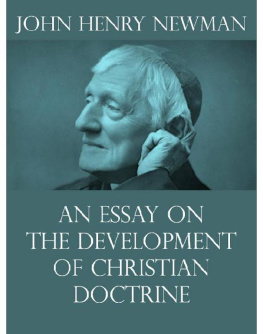
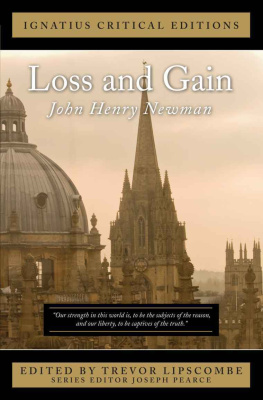
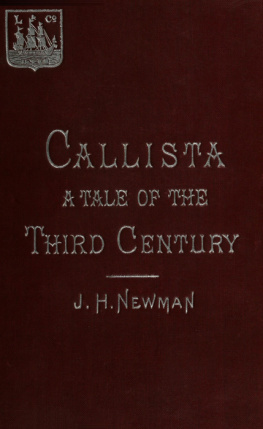
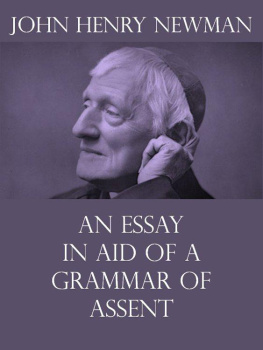
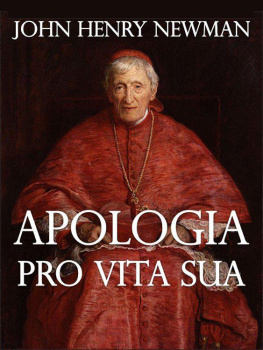
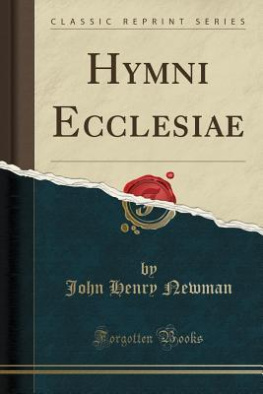
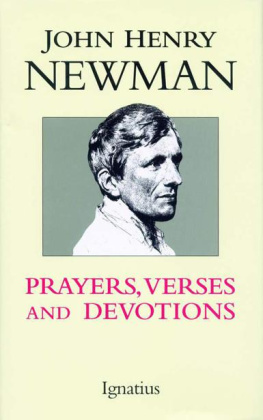
![Blessed John Henry Newman - Blessed John Henry Newman Collection [26 Books]](/uploads/posts/book/371011/thumbs/blessed-john-henry-newman-blessed-john-henry.jpg)


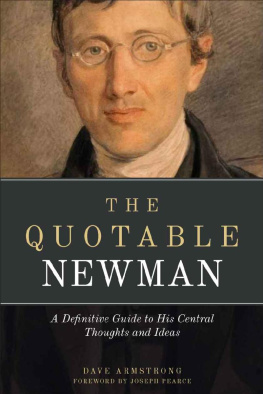
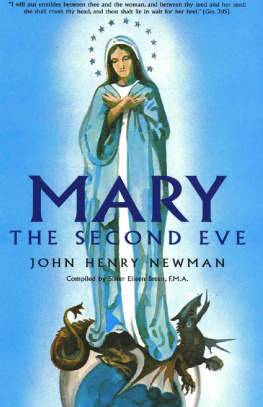
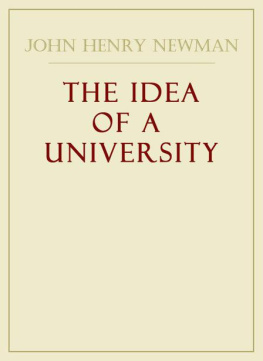
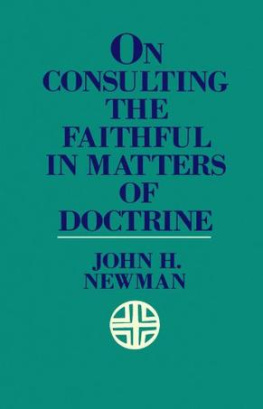
 John Henry Newman, C.O. (21 February 1801 11 August 1890), also referred to as Cardinal Newman and Blessed John Henry Newman, was an important figure in the religious history of England in the 19th century. He was known nationally by the mid-1830s.
John Henry Newman, C.O. (21 February 1801 11 August 1890), also referred to as Cardinal Newman and Blessed John Henry Newman, was an important figure in the religious history of England in the 19th century. He was known nationally by the mid-1830s.